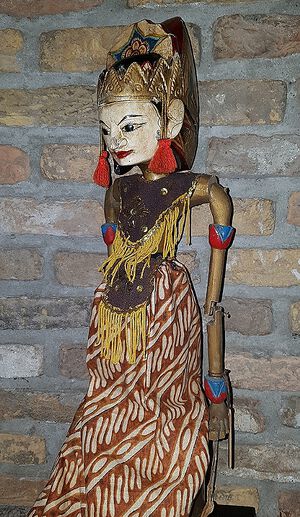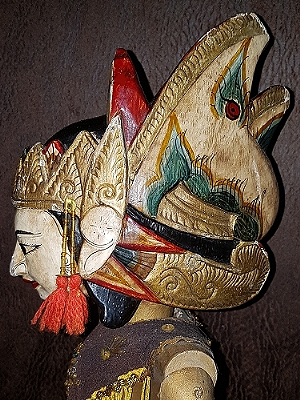Salya: Difference between revisions
(Created page with "My name is Manuel and I am studying Directing and Neuroscience at St Levan / Great Britain.<br><br>Also visit my web-site Kometa web casino ([https://game-ss.ru/ game-ss.ru]) ") |
No edit summary |
||
| Line 9: | Line 9: | ||
|Collection=Private collection | |Collection=Private collection | ||
}} | }} | ||
{{Salya}} | |||
[[Category:Wayang Golek Puppets]] | [[Category:Wayang Golek Puppets]] | ||
Revision as of 14:44, 31 October 2024
| Title | Salya - (Prabu) - Mahabharata |
|---|---|
| Other names | Narasoma (young), Mandraripa, Mandrakeswara, Mandraraja, Mandraka, Mandratpatisuta, Somadata |
| Size | 60 cm |
| Personal data | Prabu Salya is the son of Prabu Mandrapati, the king of Mandaraka State from the consort Dewi Tejawati. Prabu Salya has a sibling named Dewi Madri/Dewi Madrim who later became the wife of Prabu Pandu, the black king of Astina Prabu Salya married Dewi Pujawati/Dewi Setyawati. The only daughter of Bagawan Bagaspati, a giant brahmin at the Argabelah hermitage, with Dewi Darmastuti, a hapsari/angel. From that marriage, he was blessed with 5 (five) children, namely; Dewi Erawati, Dewi Surtikanti, Dewi Banowati, Arya Burisrawa and Bambang Rukmarata. |
| Appearance | Prabu Salya has characteristics and character; high-minded, arrogant, conceited, talkative, intelligent and clever. |
| Collection | Private collection |
Salya - (Prabu) - Mahabharata
Prabu Salya was very powerful, especially after receiving Aji Candrabirawa's inheritance from his late father-in-law, Bagawan Bagaspati, who was killed by him. Prabu Salya ascended the throne of the Mandaraka kingdom to replace his father, Prabu Mandrapati, who committed suicide. At the end of the story, Prabu Salya died on the battlefield of Bharatayuda by Prabu Yudhistrira/Prabu Puntadewa with the Jamus Kalimasada heirloom.
King Salya
Prabu Salya king of Mandraka country. When he was young his name was Narasoma from the lineage of king Mandratpati. His queen was named Dewi Setyawati, a daughter who was very loyal to her husband. Prabu Salya was powerful and had a weapon, named Candrabirawa and was a very fierce giant. The giants could not be killed, because their numbers continued to multiply. Dead one becomes two, dead two becomes four and so on. Because it is so powerful, no one can fight it. But Candrabirawa can also be defeated with patience. When Candrabirawa faced Yudistira, a person who never got angry, he couldn't approach his opponent, because it felt like he was being burned, until finally he resigned.
In his heart, Prabu Salya loved Pendawa, but because the country of Mandraka was under the rule of Astina and the king of Astina was his son-in-law, he had to favor Astina. In the Beratayuda war, when Prabu Salya drove away Duke Karna's vehicle, while fighting with Arjuna, Salya cheated by overturning his vehicle, so that Karna's arrow aimed at Arjuna missed its target. This is proof of Salya's love for Arjuna (Pendawa). In that war, Salya died while competing with Yudistira.
Prabu Salya has drooping eyes, a pointed nose and everything. Berjamgan three stacks with a larger back eagle, trimmed waderan, berpraba. Long necklaces, bracelets, pomto and kroncong. Rattan fabric.
But after the Baratayuda war broke out, Prabu Salya became hesitant. Outwardly he loves Suyudana, who is his son-in-law and also the great king of the Astina country, but inwardly he burdens the Pendawa, because the fourth and fifth Pendawa are his nephews. In addition, Prabu Salya actually loved Pendawa and therefore liked that he could stand firm. So in the Baratayuda war, he seemed helpless and lost his powers and because he fought without enthusiasm, his death was like committing suicide.
That is the picture of a person who is half-hearted and who does not have determination, until he suffers defeat as a result in the Baratayuda war, and his name is also tarnished as a king who does not defend the majesty of his crown, because he does not have the heart to fight with his own nephew, Nakula. and Sadewa.
Source: History of Wayang Purwa - Hardjowirogo - PN Balai Pustaka - 1982


